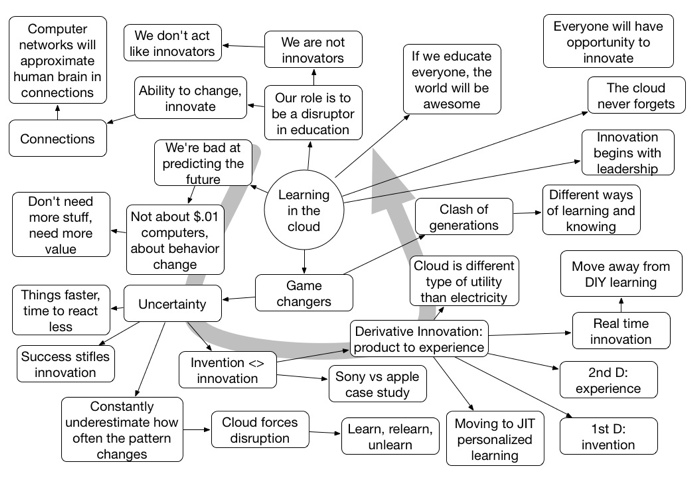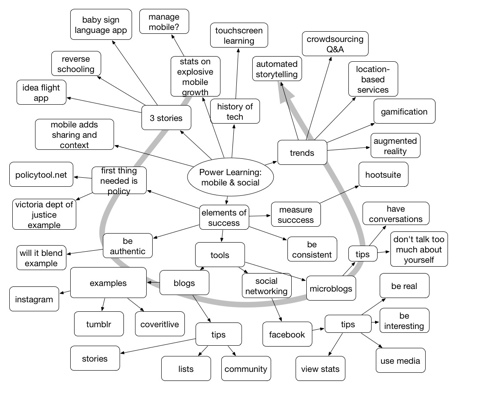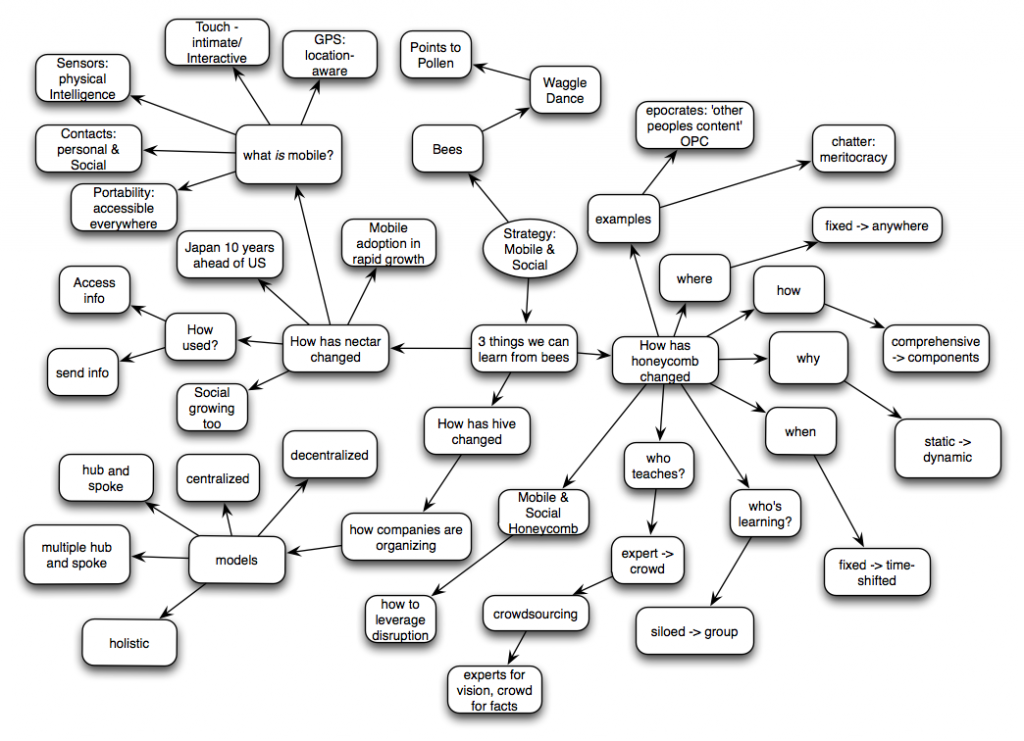The afternoon keynote at DevLearn was an energizing and insightful visitation of innovation and the future by Thom Koulopolous.
Book Review Pointer
In case you didn’t see it, eLearn Mag has posted my book review of Mark Warschauer’s insightful book, Learning in the Cloud. To quote myself:
This is … a well-presented, concise, and documented presentation of just what is needed to make a working classroom, and how technology helps.
As one more teaser, let me provide the closing paragraph:
The ultimate message, however, is that this book is important, even crucial reading. This is a book that every player with a stake in the game needs to read: teachers, administrators, parents, and politicians. And not to put too delicate a point on it, this is what I think should be our next “man in the moon” project; implementing these ideas comprehensively, as a nation. He’s given us the vision, now it is up to us to execute.
I most strongly urge you, if you care about schooling, to read the book, and then promote the message.
Quinnovation ‘to go’
The travel schedule is booting up again, and I’ll be hither and yon speaking about this and that for a good part of the coming two months. More specifically:
- From 2-3 Oct I’ll be running a two day elearning strategy workshop at Learning 3.0 in Chicago. If you want to get above the individual tactics and see how the pieces fit together, and work on a plan for you and your org, I hope to see you there. Then on Tuesday the 4th, I’ll be talking about creating Engaging Learning.
- Then, on 12 Oct in Laguna Niguel at the CLO Fall Symposium, I’ll be joining with my ITA colleagues Jay Cross and Jane Hart to talk about controversial issues for CLOs. This will be fun and worthwhile, as we will be aiming at some sacred cows.
- It’s off to Las Vegas at the beginning of November for DevLearn, where I’ll be running a mobile learning strategy session on the the 1st. If you want to get beyond just designing a one-off, and look at the broader picture of how to make mobile a part of your solution, it’s the place to be.
- That’s followed by Learning 2011 in Orlando Nov 6-9, where I’ll be hosting an author session for Designing mLearning.
- I’m still not done, as I head later that week to DC to speak to the local ASTD chapter with a talk on mobile learning and a social learning workshop. That latter will talk about both formal and informal learning, as well as looking at the different tools.
- And, to cap it off, I’ll be presenting at the Canadian Society for Training & Development’s annual conference in Toronto on Friday the 18th of November, looking forward and more broadly at the role of learning in the organization.
That may seem like a lot (and it is), but traveling on only one continent will seem easy after this past May-August ;). I hope to see you at one or more of these learning events!
Reflecting socially
About ten years ago, now, Jay Cross and I met and with some other colleagues, started what we called the Meta-Learning Lab. We’ve maintained our interest in meta-learning across our involvement now with the Internet Time Alliance, and a component we identified as one of the most valuable activities you can do is reflection.
We don’t mean just navel-gazing, of course, but instead we mean systematically stepping back and reviewing ongoing activity with a view towards looking for improvement. It’s baked into things like Watts Humphrey’s Personal Software Process, and without that level of rigor, it still has benefits. Even more so if it’s shared.
So, blogging is one way of sharing your thoughts and getting feedback (as I do here). The social processing that happens when sharing is not just for formal learning, but for personal, self-directed learning as well. Creating a representation of your understanding is valuable in and of itself, to make your thinking concrete, but sharing and getting feedback is even more powerful.
This isn’t just for individuals, of course, but also for teams. If teams share their collective thinking (blogs again, or perhaps wikis), they can get feedback not just from each other but also from non-team individuals. This improves the thinking.
And we can start using richer media than just text. We can capture our understanding with images, audio or video, e.g. conducting interviews (you think differently creating a response to a deep question synchronously than asynchronously). You can go out and create a video of something that communicates what you think. You can even film a performance by the individual or team and bring it back for discussion. What a couple of high-tech firms have done, having outstanding performers talk about or perform on video, and adding their own reflections (‘directors notes’ versions), is really powerful for learners too.
Mobile gives us the capability to be more flexible in our communication capture and sharing, which decouples our thinking from the desktop. We also may be able to review interactions in a social media system, messages and such, to reflect on our communication patterns and improve. And facilitating all this is, to me, one of the opportunities for the learning professional as we start a) expanding our responsibility for all performance, not just ‘training’, and b) start investing our efforts in proportion to the workplace impact (c.f. 70:20:10).
So, I encourage you to start reflecting personally, of course, but consider also reflecting socially, with your colleagues, teammates, and more. Learning out loud is a key to moving forward faster and more effectively.
Working Smarter
Work smarter, not harder.
Have you heard that? I did, in my first job out of college; my boss said it, but it wasn’t clear what it meant. What does ‘work smarter’ mean? I already thought I was working smarter. Well, as I’ve learned (in conjunction with my ITA colleagues), it means a number of things that organizations can, and should, do.
So, what is known about when we work smarter? We work smarter under a number of conditions: when we have a clear goal of what we’re supposed to achieve and we recognize it’s importance; when we’re free to experiment, explore, and even fail; when we have colleagues to collaborate with; and when we have the resources we need available ‘to hand’. This provides some guidance about what an organization should be doing to optimize the likelihood of success.
We need to be doing meaningful work that we’re excited about. We need to be connected to a vision, and understand how our role contributes. There needs to be transparency above and below as well as ahead, so we can see how the parts are working together.
We also need a culture where that transparency is empowering, not threatening. It has to be safe to perform in public, to share our thoughts, and to both provide and receive help to others. Where, when mistakes are made, the lessons are learned and shared.
We need to see it as important to contribute, and be enabled to communicate to the right people, and be able to work together to get the job done. We need time to reflect as well, to take time to think about what we’re doing. We should be doing that publicly too. We need to learn out loud and together.
Finally, we need the tools available. We shouldn’t have to take time to go multiple places to get what we need, and use inconsistent interfaces to use them. We should have an environment where we’re focused on our tasks, and can get who and what we need to stay focused.
How to work smarter isn’t a mystery. The mystery is why more organizations aren’t systematically breaking down the barriers to working smarter. Are you ready to get going?
Social Cognitive Processing
In an earlier post, I tried to convey the advantages of social activities in formal learning from the cognitive processing perspective, but my diagram apparently didn’t work for everyone. I took another shot for a presentation I gave on mobile social at the Guild’s mLearnCon, and I thought I’d raise it here as well.
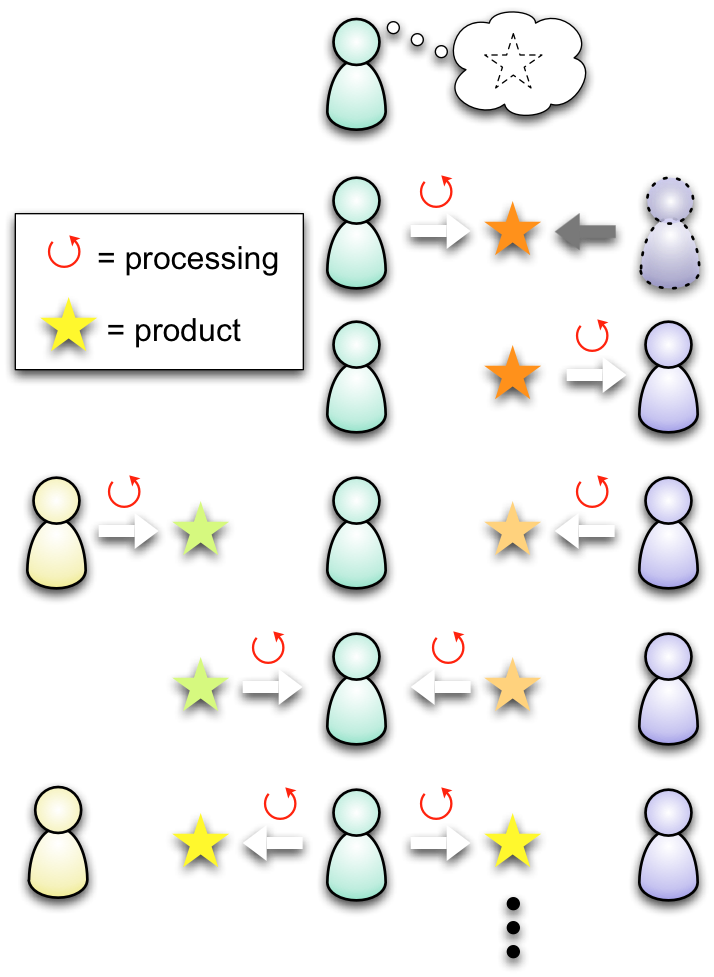 I’m going through this diagram line by line, from the top.
I’m going through this diagram line by line, from the top.
If you go from just having an idea (first line) to trying to capture it as a product (next), whether a diagram or a screed, to communicate to some hypothetical reader, you find out that you might not have thought it out fully (the first benefit to having a personal journal, e.g. blogging). And you do some processing to generate that product.
Then, if someone actually reads it, they do some processing.
If they write a response, they do more processing to crystalize their thoughts.
Then, the author, when reading it, also does some more processing.
If someone else reads it, that person does some processing, and if they write a comment, well, the process continues.
The author could then write a reply to one or both, and that causes even more processing. And so on.
And this is good. Processing is part of learning, and focused processing is part of good learning design. So, having learners capture and communicate their thoughts is a valuable learning activity. It can be personal reflections, e.g. “what does this explain in my past” or “what will I do differently in the future”, or responses to a question.
If other learners are asked to read and constructively comment (not just “great post”), you can get valuable learning outcomes.
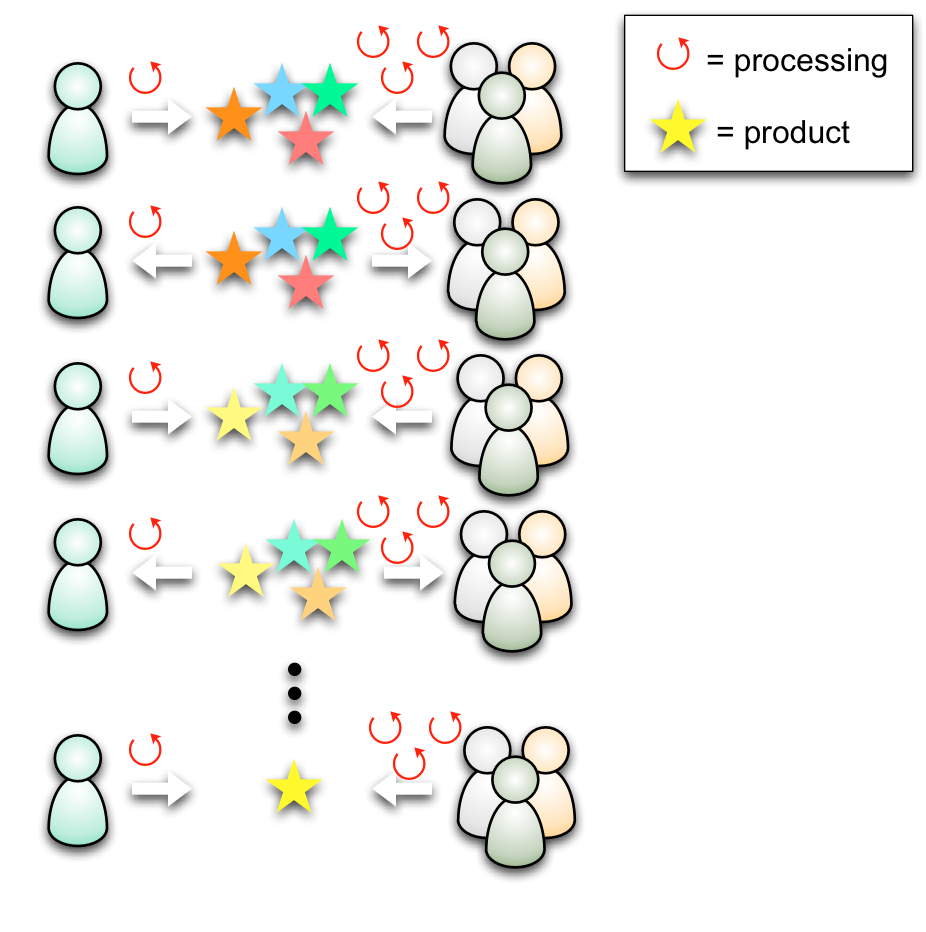 This extends to the social learning situation. Here, you have every learner contribute their initial thoughts on a group assignment (recommended).
This extends to the social learning situation. Here, you have every learner contribute their initial thoughts on a group assignment (recommended).
Then, every learner reads the other proposals, and they start to put out their integrated ideas.
As they negotiate a shared understanding as a group response, some great processing is happening.
Ultimately, they create an outcome that’s richer than what they’d create on their own.
If you’ve created the right amount of ambiguity in the project, you’ll get some great discussions. The processing benefits here are because the learners will bring somewhat different interpretations and experiences to the project, and that diversity allows a mre robust understanding to emerge.
Consequently, I suggest that social learning adds benefits to the learning experience beyond what individual assignments can achieve. You can mimic some of these effects by staging additional information, but it’s not quite as effective as individual learning (nor near as engaging).
So, does this make sense? And, hopefully, inspire you to find ways to add social interaction into your learning experiences? It’s not unique to social media, but social media give you a channel to bring these benefits to learning whenever and wherever.
Amber MacArthur #mLearnCon Keynote Mindmap
This morning’s mLearnCon keynote was by journalist Amber MacArthur. She talked about the intersection of mobile and social, though mostly talking the social side. Definitely a fun presentation with lots of humorous examples.
Jeremiah Owyang mLearnCon keynote mindmap
Jeremiah Owyang, analyst at Altimeter, keynoted the opening day of the eLearning Guild’s mLearnCon conference. He talked about the intersection of mobile and social, talking mobile definitions, organizational structures, and core transitions, using a metaphor of bees.
Beyond Talent
A post I wrote for the ATC conference:
As I prepare to talk to the Australasian Talent Conference I’ve naturally been thinking about the intersection of that field and what I do. As I recently blogged, I think there’s an overlap between OD and the work of trying to facilitate organizational performance through technology. I think Talent Management similarly has an overlap.
While technology is used in talent management, it really is more focused on the management part, supporting the role of HR in recruitment, competencies, and more. Which is good, but now there’s more on the table. We now have the benefits of Web 2.0 to leverage. To understand how, it helps to look at the charateristics of Web 2.0. Brent Schlenker talks about the 5-ables:
- findable – the ability to use search to find things
- feedable – the ability to subscribe to content
- linkable – the ability to point to content
- taggable – allowing other to add descriptors
- editable – allowing others to add content
At core, this is about leveraging the power of the network to get improved outcomes. When others can add value, they do. We have seen that in learning and development, and the drivers there are not unique to the area.
Things are moving faster, and information is increasing. Worse, that information is more volatile, as well. As if that weren’t enough, competition is increasing. The luxury to plan, prepare, and execute is increasingly a thing of the past. As a consequence, optimal execution is only the cost of entry, and continual innovation is the necessary differentiator.
As a result, the old top-down mentality is no longer a solution, one person can not do all the necessary thinking for a team. Instead, forward-thinking organizations are finding the solution in empowering their people to work together to come up with the necessary solutions. They are devolving problem-solving, research, design, innovation further down in the organization, and realizing real results from the process. Instead of having to own all the content, learning units are instead facilitating the development of answers from among the stakeholders.
Note that by doing so, organizations are also making work more meaningful and consequently more rewarding. As Dan Pink’s Drive demonstrates, individuals are more motivated by the opportunity to engage than by artificial rewards. And these results are not unique to high-tech, but being seen in organizations engaged in manufacturing, medicine, and more.
This revolution can, and should, be seen in talent management as well. Throughout the lifecycle of talent, the network can add value. Beyond recruiting, networks can be used for talent evaluation, and then within the organization for onboarding, development, performance management, and even debriefing and alumni activities.
The point is to think about how to tap into the power of people. And even when you are now hiring people, you are not just hiring what is in their heads, but what’s also in their networks. Similarly, they are choosing organizations on how well they use networks. As the Cuetrain Manifesto documented, an organization can no longer control the message. If an organization is inauthentic externally, it is a safe bet that it is similarly dysfunctional internally.
Social media is much more than just marketing, it’s a tool to take advantage of for many reasons. More meaningful work, better outcomes, and a better connection to the market are just the top level benefits. Social, it’s not just for parties any more.
Org Development and Social Media
On principle (and for pragmatic reasons), I regularly think about how to define what I do, and to look for areas that are related. As a consequence, I wonder if there’s another area I’m falling into, and more importantly, an interesting intersection that might warrant some exploration.
With my ITA colleagues, I’ve been looking at how to help organizations broaden the scope of the learning function to include informal and social learning, and leverage them to make organizations more successful. And, given that it’s not about the technology, it ends up being a lot about how to create environments where social media can be used effectively. This led me to wonder what was the proper category for that work. Is it business information systems? However, that seems largely to be about databases. Is it industrial/organizational psychology? That largely seems too focused on the individual, and on psychometrics. That’s when I looked into organizational development (OD; as our associate, Jon Husband has champions with his wirearchy work).
If you read the definition of OD, you see “effort to increase an organization’s effectiveness and viability”. That’s largely what we’re on about, too. As the Working Smarter Fieldbook says: “We foresee a convergence of the ‘people disciplines’ in organizations. As the pieces of companies become densely interconnected, the differences between knowledge management, training, collaborative learning, organization development, internal communication, and social networking fade away.” However, some of these fields are reasonably technology savvy, while others are more focused effective people processes.
As I look through the suite of approaches that OD takes, it feels very familiar. Workshops, facilitations, the interventions used resonate very comfortably with what I’ve used and seen work. The goals are also very similar. However, I don’t see a lot of awareness or interest in technology. I’m wondering if I’m missing a huge swath of work in leveraging technology to facilitate organizational development. Or whether there’s a need and opportunity to start some cross-talk and look at the intersection for opportunities to leverage technology as a tool to increase an organization’s effectiveness and viability. Kevin Wheeler, who’s organizing the talent event I’m presenting at in Sydney and has background in OD, opted for the latter. What do you think?
